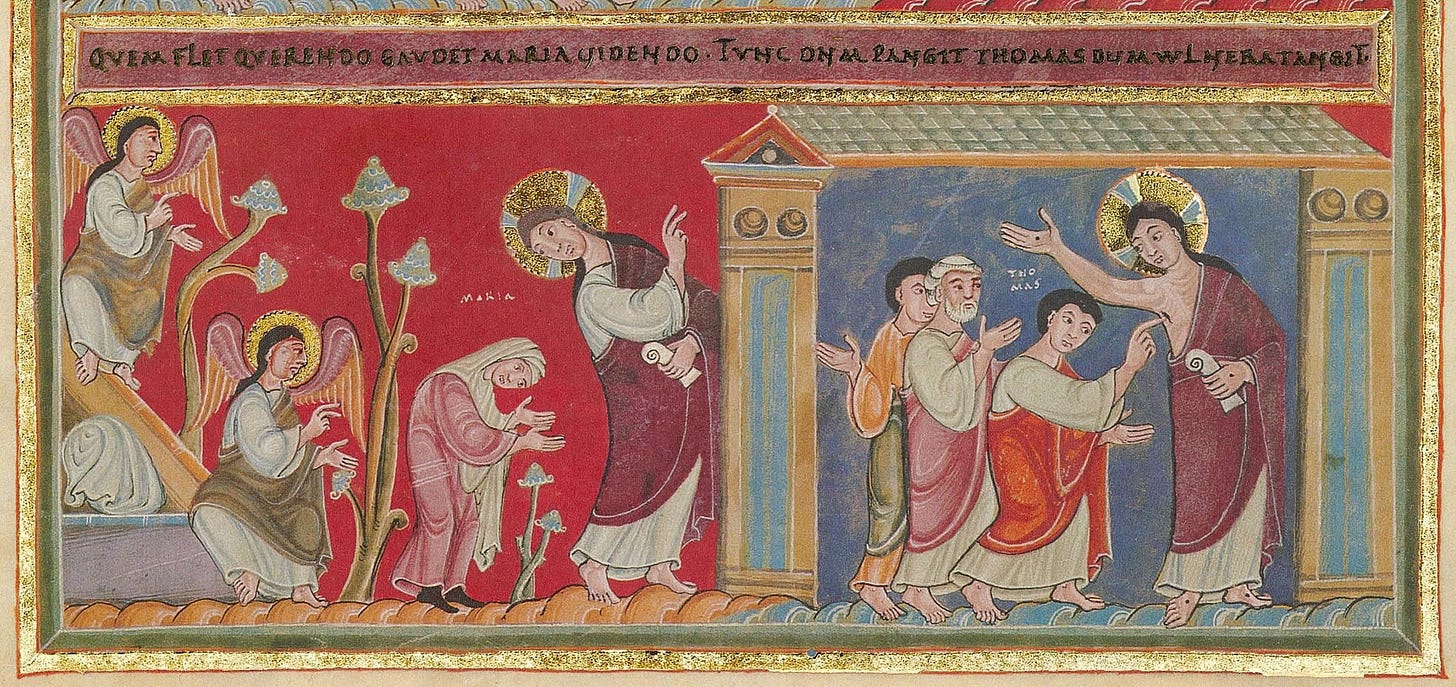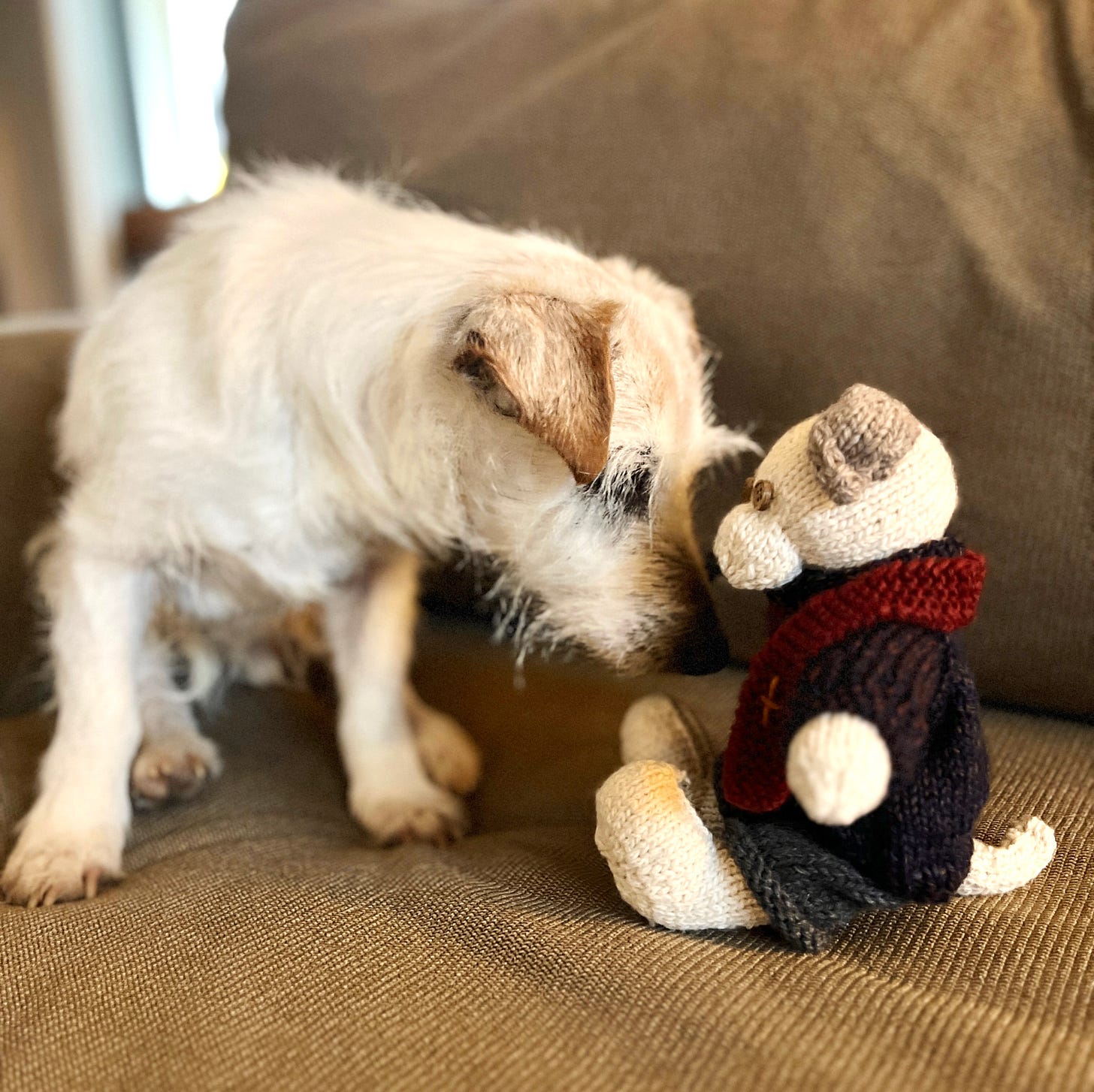Beginning to Believe
Some fragmented thoughts on Ordination Day, restoration to community, the Rev. Fozzie, and Jesus meeting Thomas where he was
Thursday, April 11
Grand Rapids, Mich.
My body is so tired, but my heart is so full.
I’ve written before that one element common to so many of Jesus’s miracles is that healing takes the form of restoration to community. For most of us, of course, that healing, that restoration, happens incrementally at best—nowhere near as dramatically as in the stories of Scripture. The best of days are those when we feel as if we have glimpsed what God’s kingdom will be. Throughout my ordination weekend, I experienced that in ways that I couldn’t have imagined. I felt so surrounded by love—and often, it took unexpected shape and texture.
One evening, Tristan and I took three of our closest friends to dinner at the chef April Bloomfield’s Brooklyn restaurant, Sailor. April is a dear friend, too—I was thrilled to see her and her wife at the ordination—and she’d told her team about the occasion. “Congratulations on your ordination!” is not something I ever expected to hear from my server at a restaurant. It forced me to recognize that, after all these years, yes, it was really happening. Then an extraordinary feast came out of the Sailor kitchen: April’s take on the traditional Greek dip skordalia was so luscious that I wanted to bathe in it. An impossibly delicious roast chicken did such tremendous honor to that bird. If you’re ever in Brooklyn, I highly recommend Sailor.
Sarah Bessey, who read Psalm 116 (“I love the Lord, who has heard my voice and my supplications...”) at the ordination, surprised me with a handcrafted “Rev. Fozzie,” complete with red stole. Here’s a photo of the living, breathing Fozzie meeting his handcrafted, ordained doppelgänger.
And my parents— I’ve vowed to honor my parents in my work, and most of the details of our relationship and our theological differences aren’t for public consumption. Suffice to say that my journey with my parents has not always been easy. But they were there on Saturday; for the first time, I got to serve them communion for the first time. Then, they were again in the sanctuary of Old First on Sunday; for the first time, they heard me preach. While we definitely still do not agree on everything, this represented a kind of restoration to community that I never dared to expect. At best I held a tiny bit of hope for it. Thanks be to God.
I’m all out of words for this week, so here are some edited excerpts from my sermon, on the story of Thomas encountering Jesus after the resurrection from John 20:24-31.
Dear Thomas has gotten something of a bad rap over the years. It’s easy to forget that, according to Matthew’s Gospel, Jesus had warned the disciples: “Beware that no one leads you astray, for many will come in my name, saying, ‘I am the Messiah.’” He’d predicted that times of suffering would come. “Then, if anyone says to you, ‘Look! Here is the Messiah!’ or ‘There he is!’—do not believe it,” Jesus had said. “Do not believe it.”
The other disciples had already gotten to see their resurrected teacher, but for whatever reason, Thomas hadn’t. And it’s not like the other disciples were super-reliable. Was it not just a couple of weeks before that Peter, three times before sunrise, hours after hearing Jesus’s instructions to remember him, denied even knowing Jesus?
Another thing that can be lost in the wake of our triumphant celebrations of Easter is that it probably didn’t feel so triumphant or celebratory in those first weeks after Jesus died. What lingered on the disciples’ noses wasn’t the fragrance of Easter lilies; it was the noxious stench of death and the cloying sweetness of burial spices. What echoed in their ears wasn’t a rousing hymn about Christ being risen. It was the baying of a crowd. It was the mockery of the soldiers. It was the sniffles, maybe even sobs, of mourners.
Thomas was walking through a season of profound grief and deep uncertainty. If we don’t have his lived experience of walking alongside Jesus, he didn’t have ours of reading these stories and knowing what happens at the end. All he knows at this point is that his teacher, his Lord, the One whom he has followed down dusty paths and across troubled waters, has been killed in a gruesome way. His friend, his wise counselor, the One at whose feet he has sat and whose hands have washed his own feet, has been publicly humiliated. How exactly is he supposed to feel?
What shines through for me in this story is the tenderness, the grace, and the love in how Jesus shows up. He doesn’t shame Thomas. He doesn’t tell Thomas that he should have known better. He doesn’t make theological arguments or quote Scripture. He just shows up and shows himself. And then he says: “Do not doubt but believe.”
That can sound like a word of correction, as if Jesus were chiding Thomas for faithlessness—and that’s how it has sometimes been read. This passage has at times been used as a cudgel against those with questions and doubts, as if you could force someone into belief. But I don’t think that’s fair to Thomas or faithful to the text or honoring of the very human mess of emotions that each one of us carries through this brutal and aching world.
I’m going to shock no one by being a word geek here for a moment; I think this matters. The Greek here can be literally translated: “Be not unbelieving but believing.” What’s lost to us, reading in English, is that there’s more than one word for “be” in ancient Greek. And the one used here isn’t the word that simply means “be,” as if “being” were a fixed state or an unchanging position. Instead, this version of the word “be” hints at a process of transformation, an ongoing experience of change. It is the “be” that could describe ice melting into water, winter surrendering to spring, adolescence blossoming into adulthood. Really, it’s more about “becoming”—or even more specifically “beginning to be”—than simply “being.”
To be clear, the Gospel of John was written in Greek, but Jesus was known to speak Aramaic. So maybe this is John’s read on things—his translation from the Aramaic, even his paraphrase. But let’s assume for argument’s sake that John is a trustworthy storyteller. To my ears, hearing Jesus saying to Thomas, “Become not doubting but believing” or “Begin to be not doubting but believing” feels different—less like a once-and-for-all command and more like a word of encouragement and a whisper of wisdom, a gentle nudge and a grace note, as if to say, “Look, I know this isn’t easy to process and it’s difficult to understand, but perhaps you can try to be a little less skeptical. I really am here.”
It’s vital, too, to recognize that Jesus’s encouragement to Thomas to believe comes after he has already met Thomas where he is, after he has invited Thomas to probe for proof, after he has urged Thomas to feel, to touch, and to do whatever it is that he needs to do to gather evidence. Jesus honors Thomas’s humanity. He doesn’t shame. He doesn’t correct. He essentially says: I really am here, with you and for you. Can you begin to believe it?
When everyone else had rushed on to Easter joy, Thomas was still in the grief of Holy Saturday. And rather than chiding Thomas for not getting with the program or reprimanding him for being stuck, Jesus meets Thomas where he is. In the midst of his confusion, Jesus shows up and affirms him and nudges him ever so slightly and walks alongside him toward the blossoming of his faith. This tells me that God recognizes the limits of our understanding as well as the longings of our heart, our different ways of perceiving what’s around us as well as our distinct journeys of life and faith.
I wonder, too, if there is an implicit recognition that none of us can live the life of faith alone. There were twelve apostles, not one; many disciples, not a single protege; a great cloud of witnesses, not one standard-bearer; a symphony, not a solo. While American Christianity has so often emphasized individual salvation, we see again and again how Jesus returns those he heals and those he loves to community, because wholeness—which is a much better translation for the Greek word that is often rendered “salvation”— wholeness will come to us and to this world only through our recognition that we belong to God and to one another as God’s gathered people. We need each other.
Even Jesus’s act of meeting Thomas can be understood as a gesture of returning Thomas to community. Everyone else in the room has already seen. Thomas hasn’t. Everyone else in the room has already been persuaded. Thomas hasn’t. And as with that one proverbial sheep who wanders off, Jesus goes chasing, empowered by love and fueled by grace, to find him and return him to belonging with the others.
I wonder, too, whether Jesus meets not just Thomas but also us in this story by demonstrating that the good news of the Gospel, of God’s love, of the resurrection, isn’t good news if it’s just a nice idea; it has to be embodied. The good news of the Gospel is that, though this world and this life might leave us wounded and scarred, God doesn’t abandon us in that pain. The good news of the Gospel is that, though we might feel battered and beaten down, God has not left us without hope. The good news of the Gospel is that, though suffering is real and powerful, love is even more so—and God’s love transcends and conquers even death.
But this good news must be embodied. It is not truly a worthy notion or a noble concept until it is embodied. It is not an enfleshed reality until it is embodied. It is not life-giving or death-rebuking until it is embodied. It does not bring strength and comfort, solace and encouragement, justice and healing until it takes on hands and feet, muscle and sinew, movement and action. It does not become material until it walks into the room and shifts the air and says, “I’m here.”

Jesus’s post-resurrection exchange with Thomas was not an end so much as a beginning. Tradition tells us that he journeyed to what’s now India, where there were Jewish communities living in cities along the coast. He found belonging and he founded churches, testifying to what Jesus had done for him. According to the records of the church in South India, he was speared and killed while evangelizing in what is now the city of Chennai.
As Thomas’s story shows us, embodiment can be so costly, yet it is both our holy invitation and our sacred calling. And while you might personally most relate to Thomas in this text, you don’t get exclusive claims to this story. You’ll encounter other Thomases too. How do we encounter those struggling to believe that they have a place in God’s story? Where do we meet those wondering if God’s love is real? How will you answer their questions? What will you do with their curiosities? What is our posture toward questioning and doubt, not just in others but also in ourselves? What do we have to offer to those who, maybe loudly, maybe quietly, maybe even secretly, carry grief and pain?
You can answer the call in so many different ways.
You embody good news when you let a struggling questioner borrow some of your hope, when you vulnerably let another human see your wounds, when you surrender this world’s me-first mentality in favor of the cause of community, and when you recognize that your individual comfort has to be secondary to the common good.
You embody good news when you honor others’ humanity and cherish others’ stories, especially those unlike your own.
You embody good news when you confess sin and commit to a better way.
You embody good news when you welcome people to your table and when you ensure others have food on theirs, when you offer a bed to the unhoused or lend a steadying shoulder to the weary, when you sit alongside the grief-stricken and stand in solidarity with the suffering, when you choose to say, “Tell me more” rather than, “Well, actually.”
You embody good news when you create safe haven for someone who needs respite and when you foster belonging for someone who feels alone.
You embody good news when you choose curiosity and courage over narrow-mindedness and fear, gratitude and grace over scarcity thinking and greed.
You embody good news when you walk the path of peace rather than the wide road of retribution.
You embody good news when you pause for that brief moment mid-argument to summon better, more thoughtful words and when you remind yourself of your belovedness to God so that you can then remind someone else of theirs.
You embody good news when you show up for those who need you to show up.
One of the lessons from Jesus’s post-resurrection encounter with Thomas is to keep showing up, arms wide open as the Messiah’s were on the cross and then again in the presence of those he loved.
It is risky. It can be uncomfortable. It is vulnerable. It can be hard. But it’s also your call and mine: to embody the good news of God’s gracious love, for one another and for the sake of a world that so desperately needs it.
Can you begin to live into that? Can you begin to believe it?
Amen.
Thanks to all of you who have sent words of encouragement and prayed for me and cheered me on. I am so very grateful.
We came home to a yard that looked so much more spring-like than when we left. I’m quite disorganized when it comes to my planting, so it’s always a surprise when things come up. Pretty happy with what we’re getting so far.
What’s on your minds? How can the Rev. Fozzie and I be remembering you in our prayers?
With gratitude and in hope,
Jeff
p.s. If you missed the livestream, you can watch recording of the ordination worship service here and the bulletin is available online too. Now that I have the Rev. Fozzie, I definitely don’t need anything else. But if you wish to make a gift, please consider a donation to one of these causes: 1. Support of the Rev. Linda Macktaby, a pioneering Lebanese clergywoman who is providing relief to Lebanese people affected by the ripple effects of Israel’s war on Gaza. (I wrote about her a few weeks ago.) 2. Helping fund the Middle East Children’s Alliance, which is bringing much-needed emergency aid to families in Gaza. Or 3. Backing the life-saving labors of the team at Ahli Arab Hospital, which continues to operate amidst devastating circumstances in Gaza City.








Im just a random reader from California, but your ordination was beautiful, Jeff. I cried and grinned my face off. So many people cheering you on! I loved especially the laying on of hands - what a cloud of witnesses! (Also, it was a little bittersweet to see a similar lineup to Rachel's funeral. I'm sure she is so proud and happy for you.) It was lovely to see your family. I'm so glad your parents were there. It was a wonderful service and such a picture of God's kingdom.
If you and Rev Fozzie could pray for me as I have some important meetings and deadlines this week, but im dealing with some depression. I need to be creative, confident, and sparkly, but I feel like a blob of gray sludge. Bad timing.
Congratulations again. (And you're right, Thomas does get a bad rap!)
Congratulations on your ordination! You have long been a pastor now you can claim the title.
Thank you for the much appreciated sermon. Thomas' story has always resonated with me and the focus on embodiment lead me straight to so many dear friends who walk the walk every day. Cant wait to share your perfectly formed thoughts with them.